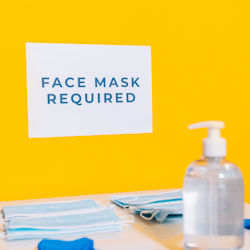Prepare to Implement Basic Infection Prevention Measures
When developing the EOP, develop policies and procedures that emphasize basic infection prevention measures.

As appropriate, all employers should give information and training on good hygiene and infection control practices, including:
- Personal hygiene: Promote frequent and thorough hand washing, including by providing a place for students and staff to wash their hands. If soap and running water are not immediately available, provide alcohol-based hand rubs containing at least 60% alcohol.
- Flexible work scheduling: Employers should explore establishing policies and practices, such as flexible worksites (e.g., telecommuting) and flexible work hours (e.g., staggered shifts). Require workers to stay home if they are sick. Encourage work at home when possible.
- Respiratory etiquette: Encourage properly covering coughs and sneezes.
- Waste containment: Provide students and staff with tissues and trash receptacles.
- Social distancing: This measure and hand washing are the two most effective measures to prevent infection. Increase the physical distance to at least 6 feet and do not shake hands.
- Sharing items: Discourage employees from using other employees' phones, desks, offices, or other work tools and equipment, when possible.
- Housekeeping: Maintain good housekeeping practices, including routine cleaning and disinfecting of surfaces, equipment, and other elements of the work environment. When choosing cleaning chemicals, consult information on Environmental Protection Agency (EPA) -approved disinfectant labels with claims against emerging viral pathogens. Products with EPA-approved emerging viral pathogens claims are expected to be effective against SARS-CoV-2.
Knowledge Check Choose the best answer for the question.
3-3. As part of the basic infection prevention measures, if an employee is sick, what should the employer require?
You forgot to answer the question!
